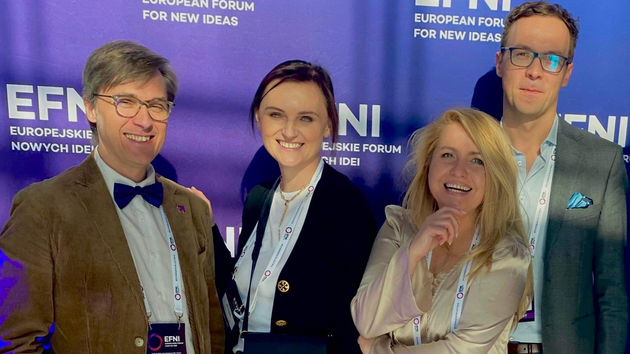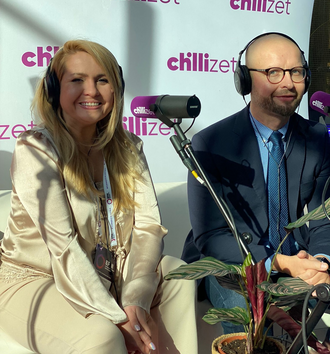Nearly 1,400 people from more than a dozen countries, including prominent economists, business leaders and scientists, attended this year's 11th European Forum for New Ideas in Sopot, which was organized by the Polish Confederation Lewiatan.
This group included scientists from the University of Lodz, who took an active part in discussion panels devoted to the most important issues of the modern business and society, such as: development of new technologies, digital transformation in organisations, or healthier life in cities.
University of Lodz wants to be an active participant in important debates and discussions. Those big ones, with international scope such as the European Forum for New Ideas, but also smaller ones but equally relevant from a local perspective. As a socially responsible university, we want to be present wherever something important happens and engage in an active dialogue with the business world. The fact that we are a partner of such an impressive venture is a result of our conscious strategy
emphasized dr hab. Agnieszka Kurczewska, UL Professor, Vice-Rector for External Relations, University of Lodz.
University of Lodz was represented by:
- dr hab. Agnieszka Kurczewska, UL Professor, Vice-Rector for External Relations, University of Lodz, a researcher at the Department of Economic Mechanisms at the Faculty of Economics and Sociology at the University of Lodz,
- mgr Ada Florentyna Pawlak, a lecturer at the Institute of Ethnology and Cultural Anthropology, speaker at the Digital University, Vice President of the Board of Directors, Society for Ethics and Philosophy of Technology. Ada Florentyna Pawlak specialises in the area of social implications of artificial intelligence and transhumanism,
- dr hab. Mariusz Sokołowicz, UL Professor, Head of the Department of Regional Economics and Environment at the Faculty of Economics and Sociology, University Lodz, Vice-Dean of the Faculty of Economics and Sociology, University of Lodz.
This year's EFNI subject matter, centred on the slogan #CoBędzieJutro [WhatWillHappenTomorrow], was implemented in 4 thematic blocks:
- Europe, is a big reset needed?
- Economy – excess or moderation?
- Will technology save the world?
- Green Horizon 2050
The discussion panels, which were created in partnership with the University of Lodz, were part of them:
Panel 1: Business in the Era of Metaverse
What technological barriers still weigh on the future and pace of Metaverse development? Who will be the main beneficiaries of this undertaking? What’s paid for and what’s widely available in a total virtual world parallel to the physical one? – these are just some of the questions that the participants of this panel were trying to answer.
Mgr Ada Florentyna Pawlak talked about virtual influencers who are not humans but virtual characters. In her opinion, their posts are no different from those of traditional celebrities – they upload photos from parties, promote selected brands, manage to make millions of dollars. Even though they are avatars, they earn the trust of the audience:
Virtual influencers show their weaknesses, deficits, e.g. they cry and arouse sympathy. But the Metaverse will also lift the spirits. The elderly are sceptical towards the new virtual reality but the young generation is fascinated by it.
The panel participants were:
- mgr Ada Florentyna Pawlak, University of Lodz,
- Jacob Turowski, Public Policy Director CEE, Meta,
- Piotr Ciepiela, EY Partner, Global Cyber Architecture, Engineering & Emerging Technologies Leader,
- Artur Skiba, CEO, Antal..
The discussion was moderated by Aleksandra Musielak, Director of the Digital Economy Department, Polish Confederation Lewiatan.
Panel 2: What competencies will the future expect from us?
How the unleashed digital transformation, covering more areas of life, will translate into new needs, relationships and competencies in organisations? What challenges are employers already facing today as new generations enter the labour market?
Prof. Agnieszka Kurczewska started with trying to define competence:
Discussion about the competences of tomorrow is really a discussion about human development, their desire, the need to learn (...) At the University of Lodz we understand the essence of competence as guiding someone through the process from the novice to the expert level. It is a difficult process, demanding for a given person. For a university, it is a challenge to provide support in such a process. The ability and awareness of building competences is their most important factor. It is a universal thing.
The discussion was attended by:
- dr hab. Agnieszka Kurczewska, UL Professor, University of Lodz,
- Piotr Pyzio, Board Member, Bosch Poland,
- Wojciech Szajnar, Director, Digital Poland Projects Centre,
- Anna Kornacka, President of the Management Board, Związek Pracodawców Pomorza Zachodniego,
- Agnieszka Wojtczuk-Turek, Director of the Human Capital Institute, Professor at the SGH Warsaw School of Economics
It was moderated by: Marek Tejchman, a journalist at Dziennik Gazeta Prawna, an editor
Panel 3: Sustainable and mobile cities
What is modernity in relation to cities? How are the prospects for the development of green transportation, especially public transportation, as well as the availability of environmentally responsible shared services?
Measuring how residents move around the cities should be the first step to the implementation of changes – local governments do not have this knowledge today
said Prof. dr hab. Mariusz Sokołowicz, UL Professor, who also mentioned problems with integrating different modes of transport in the cities.
The discussion was attended by:
- Mathieu Deloly, Director for Central and Eastern Europe, Tier,
- Piotr Borawski, Vice-President of Gdansk,
- Zuzanna Rudzińska-Bluszcz, Legal Counselor, Chairman of the Board of the ClientEarth Lawyers for Earth Foundation
- Hanna Gill-Piątek, Member of Polish Parliament
- dr hab. Mariusz Sokołowicz, UL Professor, University of Lodz.
It was moderated by: Joanna Erbel, housing expert, Member of the Programme Board of the PRS Foundation
Panel 4: Healthy Cities – which cities have the best living standards?
Can Polish cities and agglomerations compete with the West in terms of living standards, availability of services or air quality? Which cities have the best living standards and what determines these standards?
The panel participants were:
- Introduction: Agnieszka Chłoń-Domińczak, Professor, SGH Warsaw School of Economics;
- Magdalena Czarzyńska-Jachim, Vice President of Sopot,
- Anna Rulkiewicz, CEO, Luxmed,
- Michał Olszewski, Vice President of Warsaw,
- Piotr Wachowiak, Professor, Rector of the SGH Warsaw School of Economics,
- dr hab. Mariusz Sokołowicz, UL Professor, University of Lodz.
The discussion was moderated by: Marek Czyż, Director of Radio Information, Radio Zet
The European Forum for New Ideas is one of the largest conferences in this part of the continent, dedicated to global trends, new ideas and the future of Europe. Business representatives, charismatic speakers, leaders and policymakers as well as authorities from the world of culture and science discuss the most important challenges for business and societies in a changing world, global trends and the future shape of the European Union during dozens of events, panel discussions, open meetings, counterpoints or night owl discussions.
Every year, the Forum gathers over a thousand participants – representatives of the world of business, science, culture and administration, Polish and European alike. The European Forum for New Ideas has been organised since 2011 by the Polish Confederation Lewiatan in cooperation with BusinessEurope and the city of Sopot.
In previous years EFNI guests included individuals with the titles of doctor honoris causa of the University of Lodz:
Other prominent guests were: Mikhail Gorbachev, George Friedman, Zbigniew Brzeziński, Frans Timmermans, Bernard-Henri Lévy.
Source: Centre for External Relations, University of Lodz; EFNI
Edit: Promotion Centre, University of Lodz




